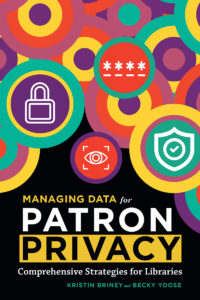An important part of data management is protecting data from loss. While good storage practices are a first line of defense, there are several other things you can do to help keep your data secure. One is to use strong passwords.
Strong passwords prevent other people from accessing your systems, either because an outsider cannot guess the password or because a computer cannot brute-force attack the system until it stumbles upon the right password. Even if you don’t deal with sensitive data, it’s still a good idea to put a barrier, in the form a password, between your data and people who might accidentally or purposefully harm your files.
Strong passwords have a number of characteristics. The first is that they are not obvious, meaning that they are not easy to guess. There are several flavors of obvious passwords, starting with the generally obvious password. This category includes passwords like:
- 12345
- qwerty
- abc123
- password (or passw0rd)
These examples are actually from a list of the 25 worst passwords of 2011. It’s worth perusing the list because it’s very enlightening.
The second category of obvious passwords include passwords that are personal to you but still easy to guess. This includes things like:
- Your pet’s name
- A family member’s name
- A birthdate, a marriage date, etc.
- Your username
- The name of your favorite band, movie, etc.
Personally obvious passwords offer a little more protection than generally obvious passwords, but are still easy to guess if the hacker knows something about you.
A third category of obvious passwords is the single dictionary word. You should avoid this category because dictionary words are more vulnerable to brute-force attack and are still fairly guessable. Here are some examples of passwords to avoid:
- monkey
- baseball
- dragon
- sunshine
These examples are actually pulled from the bad password list linked above, which is further proof why you should avoid the single-word password.
Another characteristic of a strong password is that it is not used for more than one platform. Using the same password on multiple platforms means that if one platform is hacked, you are now vulnerable on other platforms. This does mean maintaining a lot of passwords, but using a different password for each system you work on makes everything more secure overall.
Now that we’ve looked at a few things that password’s shouldn’t be, let’s look at some characteristics that strong passwords should have. The first characteristic is that passwords should be long – strong passwords have at least 8 characters and preferably more. The reason for using long passwords is that they are harder to crack – a fact which comes back to basic probabilities. There are a total of (26)^8, or over 200 billion, possible options for 8-character passwords consisting of only lowercase letters. That’s a lot of passwords to try in order to find the right one. When you add more characters, you increase the total number of permutations and decrease the probability of finding the right password on any one guess. Therefore, long passwords make strong passwords.
A second quality of strong passwords is that they mix upper- and lowercase letters, numbers, and symbols. Coming back to probabilities, we can see why this is a good thing. If we add uppercase letters into our 8-character password, suddenly we have (52)^8 possible passwords, or over 50 trillion permutations. That number goes up when you add in numbers and symbols. Plus, a lot of variety makes it harder to outright guess a password. So always use many types of characters in your passwords.
The final characteristic of a strong password is that it is something that you’ll actually remember. It’s not worth using a password that you have to physically write down in order to remember; that defeats the security of your password. The good news is you can now use a password manager to keep track of your passwords. Password managers also make it easy to maintain different passwords for different platforms, a problem mentioned above. The one thing to note is that you must use a really strong password for the manager software, as this will help keep all of your other passwords safe.
So how does one combine all of this advice into a single password? One strategy is to string a few words together and throw in some uppercase letters, numbers, and extra characters. For example, I can combine the words “badger” and “moon” into the password “1B@dger+1/4mOOn”. Not only is this a strong password, but it’s easy for me to remember by the phrase “one badger plus quarter moon”. A second strategy is to hack up a phrase you will remember. For example, I can abbreviate the phrase “wit beyond measure is man’s greatest treasure” from the Harry Potter books and make it into the password “WbMiMgT#Ravenclaw”. A third strategy is to borrow from l33t speak to swap out letters with equivalent l33t characters. All of these strategies reduce to using a bit of creativity to transform something you will remember into a strong password.
My last word on passwords is that you should never, ever share your passwords. Just don’t do it. Ever. You obviously don’t want strangers gaining access to your account, but even friends without malicious intent can mess with your files. You also give up control when sharing a password because the other person is free to further share your login information. Plus, if anything bad happens, you are to blame because the issue happened under your login credentials. Suffice to say, sharing a password is never a good idea. Take it from the The Doubleclicks and these other geeky icons: Don’t Tell Anyone Your Password.





Pingback: A Great Password Policy » Data Ab Initio